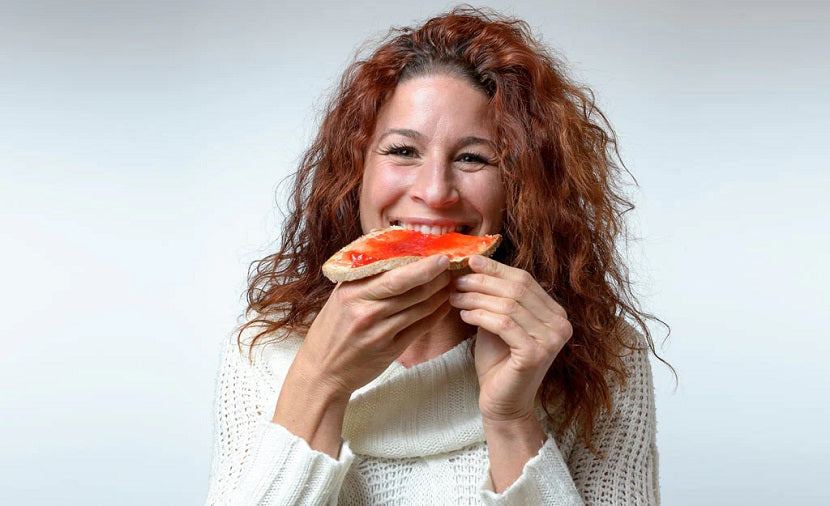Top 10 Reasons You’re Gaining Weight
By Lauren Jane

If you have decided that it’s time to reduce fat mass in order to improve your health, it’s important to be aware of the common pitfalls before you embark on your weight loss journey. Below I’ve listed 10 diet and lifestyle practices that cause women to achieve only short-term success when trying to lose weight. Be wary of these practices as they often leave you feeling like a failure; worse, these can even lead to rebound weight gain!
1: Eating too little
It’s easy to become too busy at work or distracted during the day whilst caring for the kids that you forget to eat properly. Perhaps you eat just one meal early and graze in between throughout the day. Whilst this might sound like you’re keeping your calories low, most women end up having a large meal in the evening or bingeing on ice cream or dessert because their day has felt so hectic.
Recurring stress results in chronically elevated levels of the stress hormone cortisol which leads to weight gain. Using your breath to manage stress and become more focused is one of the most effective ways to calm your nervous system and change your unhealthy eating habits. Learn more about breathing practices that can help you cope with chronic stress.
2: Poor breakfast choices
Many women are big fans of a simple brekkie of white toast and jam, cornflakes or Weet-Bix with a mug of Milo or coffee with milk. Whilst these choices are common, they're not supporting your health nor are they nutrient-dense or satiating for any age group.
Whatever time you take your first meal of the day, keep in mind that it’s fueling the bulk of your activities so it needs to be a well-balanced one. This means it should have the right balance of unprocessed carbohydrates, fats and proteins. You can learn more about what macronutrients are and how to balance them in this article.
3: Emotional or binge eating
Eating to excite your senses rather than to fuel your physical body once in a while is OK. Even eating to comfort a broken heart or stressed mind is fine but food doesn’t have to be our primary coping mechanism. Make sure you have stress management practices in place to help you navigate through the daily challenges life can bring. Try non-digital options like a walk in nature, painting, singing, dancing, a hot bath, or an uplifting chat with a dear friend.

4: An empty pantry
If it's within your budget, having a nicely stocked pantry and fridge is non-negotiable to making healthy food choices. A lack of fresh foods is the most common excuse to opt for unhealthy takeaways or dine-outs. Keep wholesome staples in the freezer to tide you over when you're exhausted or unable to make it to the shops.
5: Thinking you don't have time for good nutrition
Frankly, it’s not a matter of how much time we have or don’t have. Rather, it’s a matter of deciding what’s important to us and then doing what is most needed. Priorities, in other words.
Have you considered food preparation in the evening before bed or making a little extra dinner to save for lunch the following day? You could freeze big batches and make a list of healthy, packaged foods in your storage. If you work long hours and your budget allows, look into a healthy food delivery service.
6: Inadequate protein and/or fat in meals
A fruit smoothie or salad sandwich are common choices when trying to eat healthily. Unfortunately, whilst they’re fresh and nutritious, neither are very satiating over the day nor sufficient in fueling your muscles or brain. Poor dietary intake and nutritional deficiencies are a major block to effective fat burn. The majority of overweight individuals consume far too many refined carbs, inadequate protein and quality fats which can result in blood sugar imbalances, B vitamin deficiency, poor muscle quality, inflammation, impaired gut health, and sluggish bowels.
Try adding flaxseed, nuts, avocado, Happy Weight powder, oily fish, or free-range eggs to your meals.
7: Believing you can't have comfort food
This leaves us with a feeling of deprivation. The truth is that there are plenty of decadent foods that will also nourish the body and it's really a matter of exploring your options. I love the simplicity of warm oats with caramelised Medjool dates, cinnamon, and coconut nectar. The dessert section in the HHY website also has lots of healthy choices for every sweet tooth!
8: Inadequate fibrous veggies
A comprehensive meta-analysis of 142 articles from 95 population studies shows that the risk of dying prematurely from all causes was reduced by almost a third in people who ate 800 grams of fruit and vegetables daily (about 8 servings). The risk of cardiovascular disease was also reduced by about a quarter compared to those who ate very little or no fruits and veggies at all.
Fibrous veggies should be included in at least two of your daily meals. This refers to veggies other than your salad greens. Think broccoli, cauliflower, zucchini, eggplant, mushrooms, sweet potatoes, asparagus, Brussels sprouts, etc. Focus on what your body needs and not what it shouldn't have.
9: Snacking on muesli bars
The majority of muesli bars on the market are full of added sugar and dried fruit. Be more creative with your snacks – there are plenty of options to buy for those who don't have time in the kitchen. Think of kale chips, roasted chickpeas, raw nuts, dehydrated fruits, protein ‘bliss balls’, chia puddings, boiled eggs or falafel. This is a great guide to snacking.
10: Forgetting to drink water
Yes, this is a simple one but so many of us forget the importance of hydration. It’s easy to mistake thirst for hunger and being dehydrated leaves us feeling fatigued and less capable of detoxifying.
Have a big glass of warm water with a squeeze of lemon upon waking and invest in a stainless steel or glass drinking bottle to carry with you during the day. If you don’t enjoy water, remember the value of herbal tea and try adding a splash of our Happy Greens to your water for some sweetness and tang!
Blocks to losing weight
Now we have addressed some of the reasons you are gaining weight, let's look at some of the reasons why you may be struggling to lose weight.
Some of the common BLOCKS to losing weight are;
- Hormonal imbalance
- Poor liver function
- Reduced digestive capacity
- Thyroid sluggishness
- Poor sleep
- Imbalanced blood sugar levels
- Medications
- Stress
- Incorrect diet and/or exercise intensity
Our practitioner team can help you understand your individual blocks however a good place to start is by taking our online women's health assessment which can identify which of these issues are more common. The assessment is free and you will receive a comprehensive report. Simply click this link.
For more information read this article on BLOCKS to Losing Weight.
REFERENCES
Benton, D., & Young, H. A. (2017). Reducing Calorie Intake May Not Help You Lose Body Weight. Perspectives on psychological science : a journal of the Association for Psychological Science, 12(5), 703–714.
https://www.ncbi.nlm.nih.gov/pmc/articles/PMC5639963/
Frayn, M., Livshits, S., & Knäuper, B. (2018). Emotional eating and weight regulation: a qualitative study of compensatory behaviors and concerns. Journal of eating disorders, 6, 23.
https://pubmed.ncbi.nlm.nih.gov/30221002/
Padavinangadi et al. (2017). The Impact of Eating and Exercise Frequency on Weight Gain - A Cross-Sectional Study on Medical Undergraduate Students. Journal of clinical and diagnostic research : JCDR, 11(2), IC01–IC03.
https://www.ncbi.nlm.nih.gov/pmc/articles/PMC5376784/
Yau, Y. H., & Potenza, M. N. (2013). Stress and eating behaviors. Minerva endocrinologica, 38(3), 255–267.
https://www.ncbi.nlm.nih.gov/pmc/articles/PMC4214609/









Leave a comment
This site is protected by hCaptcha and the hCaptcha Privacy Policy and Terms of Service apply.